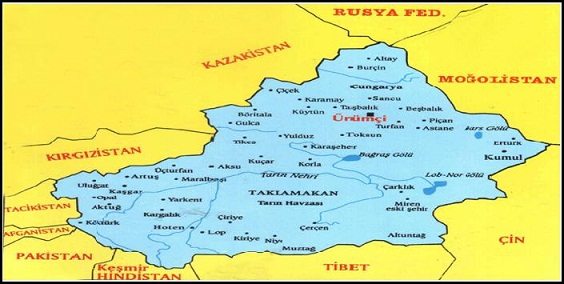Hoca (Koca/Kucha), because his local laborers desert him
thanks to Chinese pressure.//

Albert Von Le Coq at Kizil.
One morning, in order to continue our research, together with my
colleague Bartus we were riding on horseback through a pass when
we saw about 60 soldiers with the military governor of Hoca (Kucha)
in the lead galloping toward us. We let out a friendly cry as we raced
at full throttle to meet them. No one in our party had a revolver so we
were a bit concerned, but the encounter was quite amiable.
We acted as guides for these Chinese soldiers, showing them the
ancient ruins and structures and explaining their history. They weren't
particularly interested, though, and they left us in the evening, but on
very friendly terms. Yet, after they departed we heard a scream so I
rode my horse in that direction. It turned out that the governor's
Turkish interpreter was beating the tax collection agent who had
provided grain to us because this fellow was assisting foreigners.
I took the interpreter by his collar and brought him to the governor,
who had stopped there himself because of the incident. I vociferously
complained through a Turk from Turfan who spoke Chinese. In
response, the governor smiled and extended his hand to me. He
explained that the tax collection agent was beaten because it was
claimed that he had botched some tax matters and helped our
exploration team.
In the end, the Chinese soldiers and I parted amicably. Nevertheless,
I was concerned about the incident and that evening my concerns
were confirmed when the Kırış villagers said they wanted to return
to their village. However much I tried to make them stay it went for
naught because in the dead of the night they all left.

Von Le Coq, standing far right.
Fortunately, Bartus was on the verge of finishing his work, although I
wanted to examine a few more temples. But since we only had the
two laborers we borrowed from the Russian and English consulates in
Hoca, I had to admit that I could not continue with my research without
more help. Two days later, with Bartus having finished his work, I
sent a letter to the local civilian mandarins, explaining that Hoca's
climate was detrimental to my health so I would be leaving for Kashgar.
News of my departure pleased the local officials to no end. Right away,
we were provided with grain and transport vehicles. After staying in
Hoca for a short time, we received a fond farewell from the Chinese
and headed west. The Chinese were glad to see us go because this took
the responsibility of looking after us off their shoulders. But their
concerns were not limited to us. There had nearly been some serious
riots in Hoca against the Russian Turks from Fergana. In addition,
there were rumors of unrest coming from the south and southeast -
vicious political killings had occurred in Lob and Guma.

Aksu and Maralbaşi, heading west toward Kashgar, are both
in the left-center part of the blue map of Sinkiang province.
Our next destination was Maralbaşi, which ancient Turkish scribes
named Barçok (possibly meaning Bharuka, an ancient name from
the Buddhist period here). The people who live in the area between
Maralbaşi/Barçok and Aksu are the Dolans.
//END of PART FIVE//

Hiç yorum yok:
Yorum Gönder